Northeast Veterinary Clinic
ABC Externship Facility
Northeast Veterinary Clinic is an established clinic with modern technology; founded in 1981, it is located in El Paso, Texas. It has 10 veterinarians on staff and the team has provided services for a variety of animals, from dogs, cats, guinea pigs and rabbits to hedgehogs, ferrets, snakes, turtles, lizards, birds and fish. The clinic provides regular and well as emergency care for its patients. The staff also works with the City of El Paso to help spay and neuter feral cats. Co-Head Technician Letty Lawrence noted that clients have described the facility as a busy but old-fashioned, family-oriented clinic with a hometown feeling.
What is the most unusual animal your facility has treated?
The strangest animal would be a koi fish.
What part of the veterinary field do you enjoy most?
When we have puppies and kittens come in to the facility, they provide some relief among the sick and injured patients, so I enjoy them the most.
Has your facility hired any Animal Behavior College graduates?
Yes, we currently have three on staff. Two are Assistant Head Technicians and our third is a Training Leader.
What techniques and/or methods do use to help your students gain as much experience, skill and knowledge as possible before graduating?
We place students in various areas of the hospital to demonstrate the importance of each of the areas, from obtaining patient history and taking radiographs to monitoring anesthesia.
Would you recommend ABC to anyone looking to pursue a career in veterinary assisting?
I have; it is a great way to get people into the field because not everybody has the opportunity to go to traditional and/or out-of-state colleges.
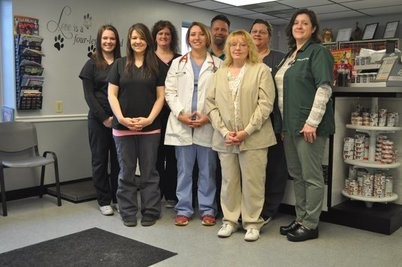
Hermitage Veterinary Hospital
ABC Externship Facility
Hermitage Veterinary Hospital, located in Hermitage, Pennsylvania, is a two doctor practice that was established in 1987 and has since joined with the VetCor family of hospitals. This hospital has nine employees, each of whom are each passionate about caring for a wide range of pets.
What is your position/title at the facility?
My name is Matt Hamilton and I am the hospital manager here at Hermitage Veterinary Hospital.
On average, how many patients does the facility see on a daily basis?
On average, our hospital sees about 24 to 28 patients per day. We started off strictly as a small animal hospital but since Dr. Devon Klingensmith joined our team back in June 2015, we are now able to see exotics, reptiles and birds as well.
What do you like most about participating in the ABC Mentor program?
We are relatively new to working with Animal Behavior College students, but so far we have thoroughly enjoyed introducing our students to the world of veterinary medicine. We also just recently hired an ABC graduate and she is doing an amazing job in the field.
What is the most important skill a veterinary assistant can learn at your facility?
I believe that technical skills are great, but as a veterinary assistant, the most important thing to learn is how to remain calm and stay patient. While our four-legged friends can’t speak, they are very adept at sensing our emotions. When our veterinary assistants remain calm, the patients are more likely to remain calm as well. This makes for a safer and more satisfying experience overall.
Would you recommend ABC to anyone looking to pursue a career in veterinary assisting? If so, why?
Even though we are new to working with ABC, so far I can say I would most certainly recommend ABC to future veterinary assistant students. The staff is friendly and knowledgeable and if our new employee who recently graduated as a certified vet assistant is any indication of the programs success, it is most certainly top notch.
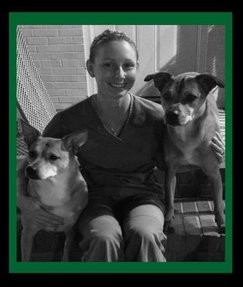
Cross Creek Animal Hospital
ABC Externship Facility
Jen Finch is head of patient services and lead technician at Cross Creek Animal Hospital in Fayetteville, N.C. The staff sees almost 100 patients a day in their boarding, grooming and four-doctor veterinary hospital. In order to accommodate its clients, the facility has extended hours during the week from 7 a.m. to 9 p.m., and is open on Saturdays from 7 a.m. to 1 p.m. In addition, Jen and her team have taken a dozen ABC veterinary assistant students in for their 90-hour externship.
What part of the veterinary medical field do you enjoy most?
I love client education; it allows me to teach people how to be better pet owners. It’s not even the animals; it’s helping the people help their pets.
What do you like most about participating in the ABC Mentor program?
ABC students bring a new atmosphere into the hospital; they are excited about things that we have forgotten about. In teaching them, it helps us appreciate and remember those details again. They bring youth and a fresh take on things. We may be bored with what roundworm looks like under the microscope, but they aren’t, so we always try to show them these things.
Describe why you think it is important for VA to have on-the-job experience.
You can read anything you can from book, but you won’t get better without practice. You can’t get better at finding a vein for blood draws by looking in a book, you need to practice.
What is the most important skill a veterinary assistant can learn at your facility?
The students from ABC do everything a veterinary assistant does, they are just supervised. So they get some great practice being a veterinary assistant. They suit up for surgery, they restrain, they run dogs—they do it all.
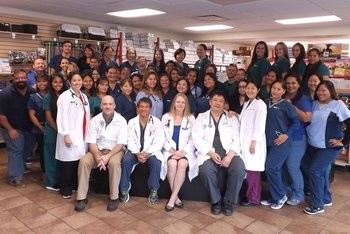
VCA Family Animal Hospital
ABC Externship Facility
VAP Mentor Facility in the Spotlight – November 2015
VCA Family Animal Hospital
VCA Family Animal Hospital is a state-of-the-art, 15,000-sq.-ft veterinary facility located in Pearl City, Hawaii. It first opened its doors in 1992, and has grown to have 125 employees. The friendly staff at VCA is trained to the highest standards, and considered pioneers in pet preventative care.
What types of animals are cared for at your facility?
Here at VCA, we see the usual cats and dogs on a daily basis. However, we are lucky to also see a wide variety of animals including pocket pets, such as rabbits, and guinea pigs, birds, Jackson chameleons, turtles and other reptiles.
What part of the veterinary medical field do you enjoy most?
I enjoy the emergency part of the field. The adrenaline rush, the satisfaction of saving lives and the appreciation from our clients and patients that we help. I feel proud and accomplished every time we work together to save a patient’s life. I love the comradery and the passion that kicks in when we are working to save a patient.
What do you like most about participating in the ABC Mentor program?
We love being able to help aspiring veterinary assistant students achieve their goals. It’s so refreshing to have them come in and be enthusiastic and motivated to learn and grow. We want to leave a great impression on them; one that they’ll remember us by. To know that we, here at VCA Family Animal Hospital, were able to help students achieve their ultimate goal of becoming a veterinary assistant.
What is the most important skill a veterinary assistant can learn at your facility?
Restraint, Restraint, Restraint. This small but key skill is such an important thing to learn and master. We want to ensure that our extern students understand how important it is for them to practice proper restraining technique. This fundamental tool is important for the safety of our patients, the people they are assisting and themselves.
Has your facility hired any Animal Behavior College students or graduates? If not, would you consider doing so if a position became available?
Yes. We have hired three students from ABC and have offered our most current one a position.
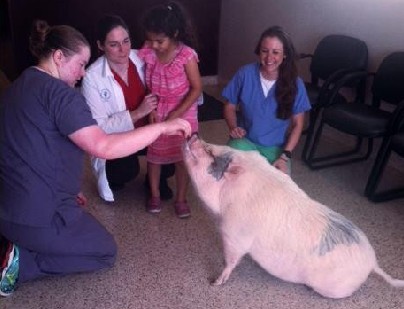
Lakeside Animal Hospital
ABC Externship Facility
Located in Cameron, N.C., Lakeside Animal Hospital has been open for a little more than a year and a half. It is a beautiful 3,000 square-foot top, notch hospital, with 16 employees. The facility sees around 30 to 40 patients a day. Lakeside is owned by Debbie Corpuz, D.V.M., who primarily sees small pets and the occasional interesting exotic. Dr. Corpuz recently signed on to be a mentor for ABC and so far has taken on one student from the Veterinary Assistant Program, whom she hired after the externship was completed.
What is the most unusual animal your facility has treated?
The most unusual animal we have treated is, hands-down, a Koi fish.
What type, if any, of volunteer work, particularly anything animal-related does the facility participate in?
The facility has trapped/neutered/released many feral cats in the area, as well as rescued and adopted out several litters of kittens and dogs. We have been sponsors for the local Ruritan Club, the West Harnett Lions Club, a Carolina Lakes HOA run and a tournament held by Tiger Rock in Sanford.
What techniques/methods to do use to help students gain as much experience, skill and knowledge as possible before graduating?
We require independent reading on the material listed on the course curriculum and assigned papers for the student to demonstrate understanding on those subjects. Physical activities are demonstrated to the student first, who is then allowed to do that activity with or without further guidance. Most or all activities are documented via photo or in writing so the student could create a portfolio of all they did during their externship.
What part of the veterinary medical field do you enjoy most?
My favorite part about working in this field is both performing surgeries and working in internal medicine.
What do you like most about participating in the ABC Mentor program?
We most enjoy helping an individual understand more about the veterinary field to further their goals and success.

Colonial Animal Clinic
ABC Externship Facility
Colonial Animal Clinic started working with Animal Behavior College in 2011. The 3,285-sq-ft hospital is located in Flatwoods, Ky. It is a one-doctor practice and typically sees 26 patients a day. The clinic is equipped to do surgeries, radiographs, dentals, grooming and boarding. Cats and dogs are the primary patients, with the occasional pet bird added to the mix. The office manager at the facility, Reva Allen Ford, happily supplied the following answers.
Why is it important for students who want to become a veterinary assistant to have on the job experience?
Theory without practice is dead; you can’t develop skills without practice. Most businesses want an applicant with skills— without skills, an applicant isn’t as employable. In addition, it’s impossible to get ready for real-life situations without the ability to respond to real-life situations. That ability to respond comes with hands-on training.
What is the most important skill for a veterinary assistant to learn in the hospital?
It’s a toss-up between communication and restraint. It’s so important in any job to have good communication skills. I can’t think of any skill that an employee will use more, no matter their position. If we’re poor communicators, we’re not going to get along very well professionally or personally. Students need practice with interviewing, practice communicating with clients (taking patient histories, client education) and practice communicating with doctors and staff. Then there’s restraint—without proper restraint there’s no exam and forget any type of diagnostics—plus the holder puts themselves and their peers at risk for injury. In my opinion, restraint is the foundation of all learned skills. Teaching, practicing and perfecting restraint is paramount to a student’s success in gaining a strong skill set.
How has your experience been since becoming an ABC Mentor Facility?
Our experience has been a very positive experience. I must add, though, that we invest a lot of time, energy and effort into each student. If a mentoring facility isn’t willing to do so, they’re not going to enjoy our success. It’s a simple matter of cause and effect—you get back what you put in.
What do you do with your students to help them gain as much experience, skill, and knowledge as they can before graduating?
The first thing we do is encourage the student to spend more than their required 90 hours of externship. If the student is willing to invest the time, we’re willing to give back generously. In addition, from day one, we follow the “Competency Evaluation Form” checking off skills as they’re learned. Students starting in the kennel learn the basics of animal care, and gain a better appreciation for that “lowliest” of positions.
Would you recommend ABC to anyone looking to pursue a career in veterinary assisting? If so, why?
Absolutely, ABC goes beyond theory. They play a huge supportive role in assuring the success of each student. They act as liaison between student and practice, helping place students in externship positions in close proximity to that student’s home; they provide open dialogue between the student and the practice assuring that course requirements are met and completed; and they “hold” the student’s “hand” from start to finish. I especially love their follow-through.
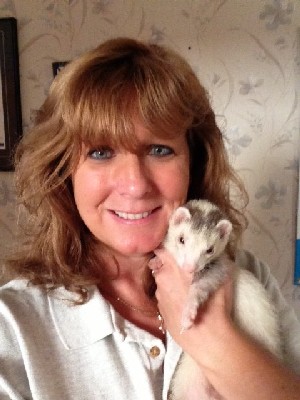
Jefferson County SPCA
ABC Externship Facility
The Jefferson SPCA is a nonprofit organization that is located in Watertown New York. This shelter was founded in 1891 to help protect and care for the domestic animals in Jefferson County. This is also the only non-kill shelter in the surrounding area. They also have another satellite location that is located inside the local PetCo where they are able to set up adoptions to adopt out animals in need of homes. The shelter houses a number of animals from dogs and cats to birds and reptiles as well as some other small animals. The shelter is open Tuesday, Thursday, Saturday and Sunday from 10:00 am to 5:00pm and extended hours till 7 pm on Wednesdays and Fridays.
The great staff at the Jefferson SPCA are always willing to take on and mentor our veterinary assistant students in the area. The students volunteer their school required hours at the shelters on site veterinary location. This is where the students are able to help assist the veterinarian in preparing for surgery, restrain the animals for necessary vaccinations, administer medications, inserting microchips, as well as making sure the facility is a clean and safe environment so as to keep all the housed animals healthy. One of the biggest pieces of advice that can give to all potential vet assistant students help them succeed is to “listen, follow procedure, and pay attention to what the veterinarian is asking of you.”.
The staff at Jefferson SPCA always recommends Animal Behavior College to anyone looking for a career in the veterinary field. They are located in a type of rural area where the education for this field is limited and the closest school is over an hour away, whereas ABC can help provide the schooling and knowledge for the students in their homes. The facility thinks it is very important for students to receive on the job experience which is gained through the externship portion of the program because no amount of educational experience can compare to on the job training.
Over the years the facility has taken on about 100 volunteers many of which have been ABC students. They love having volunteers and are always willing and eager to share their knowledge and tips on how to perform tasks properly and easily. They feel that they and ABC share a similar bon of rescue. They love being able to educate and spread the word about the need for rescuing, spaying/ neutering, and adopting animals through the ABC students. Their greatest joy that they are able to share with the students is when one of the resident animals is adopted out to a new forever home.
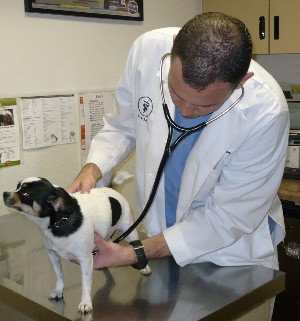
Humane Society of San Bernardino Valley
ABC Externship Facility
The Humane Society of San Bernardino Valley (HSSBV) began on March 16, 1970, with a few dedicated volunteers who were there to care for and improve the quality of life for many animals. Joyce Young Martin was the driving force behind the HSSBV, which incorporated her dream of developing a low-cost spay and neuter clinic in the area. By educating people about animals, both domestic and wild, Joyce was able to bring in more people to help make her dream a reality.
Located on Orange Show Road in San Bernardino, Calif., the HSSBV is open Monday through Friday from 8:45 a.m. to 4:30 p.m. for walk-ins and appointments, and on Saturdays from 8 a.m. to noon for walk-ins only as well as a vaccination clinic. They have taken on at least 10 ABC students for externships so far. Even though it is a humane society, HSSBV provides ABC students with a well-rounded experience, working with both clients and the patients during surgeries, treatments and routine procedures.
Students can’t learn everything in a classroom. At HSSBV, thanks to Dr, Raines and several staff members ABC students get lots of hands-on experience, including client education and client/patient interaction. Those at the facility stress that one important skill a veterinary assistant needs to learn is how to communicate well with clients and how to educate the clients on their pet’s needs. Every ABC student who has externed at HSSBV enjoyed their time and never failed to express thanks for having learned so much.
This facility primarily sees cats, dogs and rabbits. At the Humane Society of the San Bernardino Valley, they love teaching others and seeing them succeed. The staff ensures ABC students complete all the necessary externship tasks and experience everything from checking clients and their pets in to assisting during surgery and recovery. Dr. Raines typically pairs students with either a veterinary assistant or an RVT who enjoys mentoring. The staff at HSSBV also knows it’s equally important to educate students on veterinary assistant tasks, as it is to teach them about the prevention of pet overpopulation.
The HSSBV provides low-cost spaying and neutering services, low-cost vaccinations, medical services to pets and education classes to more than 17,000 children. Through their hard working team members (one of which is a prior student of ABC’s), volunteers, generous donations and humane education programs, HSSBV will continue to make a difference by caring for and protecting the animals within their community.
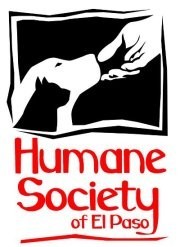
The Humane Society of El Paso
ABC Externship Facility
In the past few months Animal Behavior College has been fortunate enough to spark a wonderful partnership with The Humane Society of El Paso. This facility is a very large sanctuary with 100 kennels containing approximately 174 animals. In addition, their foster program cares for 50 to 75 animals off-site, and continues to grow. The veterinarian on staff, Dr. Flossi, sees at least 30 patients per day. He and his staff mainly treat dogs and cats, but occasionally see rats, pigs and donkeys. Their main goal is to find these animals a loving home. They are committed to pairing these pets with families that share this same passion.
The Humane Society of El Paso recognizes the importance of hands-on training when entering any career in the animal industry. They believe that this portion of the ABC program helps students make an informed decision on what further avenues they would like to explore in this field. Dr. Flossi says, “It is important that students have this experience and can then decide if this is the right field for them. In our facility, it is about learning the highs and lows of animal rescue. We want them to know it is important that veterinary professionals see themselves as educators to the public on animal welfare.”
ABC students have been described as “energetic” and “passionate” volunteers. They have shown the staff at the humane society that they have a strong desire to learn and serve the animals and the community. Although ABC has only recently started working with the shelter, 5 students have already been sent there to complete their externship. In fact, the first ABC student has since been hired as a Volunteer Coordinator. The students from ABC are always on the top of the list when they are in need of a new staff member. The staff feels that our relationship has been a positive one because they have gained a new employee and dedicated volunteers.
The staff also believes that the first step to gaining experience, skills, and knowledge, is by putting the student to work! The repetition of tasks and guidance provided by the humane society employees help the students feel confident in their abilities in this ever changing and exciting field. In their opinion, The Humane Society of El Paso believes that ABC is a great place to start if you are looking to pursue a career as a veterinary assistant.
ABC looks forward to having a long standing relationship with The Humane Society of El Paso. This is a wonderful facility that has already opened many doors for ABC students, and hopefully there will be more to come!
4991 Fred Wilson Ave., El Paso, Texas 79906, (915) 532-6971, www.hselpaso.org.

Northeast Veterinary Clinic
ABC Externship Facility
Northeast Veterinary Clinic began operation in 1981 in El Paso, Texas. It is open 7 days a week from 8 a.m. to 8 p.m., and sees about 100 patients a day. Northeast is a large facility and has approximately 50 employees to help to care for small animals and exotics as well.
What is the most important skill a veterinary assistant can learn at your facility?
Patience and a lot of hands-on experience are some of the most important skills students will learn while at Northeast Veterinary Clinic. We are such a high-volume clinic and see a wide variety of patients with different needs throughout the day. This gives students a chance to encounter all types of different species and breeds. This helps expand students’ skills as they are able to see the various treatments required for all different types of animals.
Describe one of your best experiences as an ABC Mentor Facility.
We have had several great experiences. We have encountered many students who have shown dedication and motivation, and several of the ABC graduates have become some of our best employees.
How many ABC students has your facility mentored?
So far, we have mentored eight to 10 students from ABC, and have hired quite a few.
What do you like most about participating in the ABC Mentor program?
What we like most is how we get to watch the students grow before our eyes. We use the provided outline the students have from ABC and hands-on experience. We enjoy watching as they begin to put into practice what they have been taught. It is very rewarding.
5) What is the most unusual animal your facility has treated?
We have seen a number of unusual animals being that we see exotics, including pot-bellied pigs. Most amazingly, we have performed a successful surgery on a fish.
6) Would you recommend ABC to anyone looking to pursue a career in Veterinary Assisting? If so, why?
Yes, we would recommend ABC to anyone interested in pursuing a veterinary assistant career. We have had such great students come from Animal Behavior College. Many of the students we have mentored have joined our team, and have become great assets to our facility.
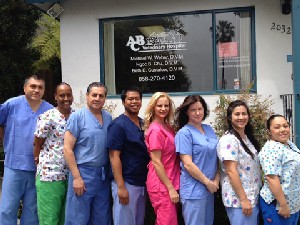
ABC Veterinary Hospital
ABC Externship Facility
In 2010, Animal Behavior College began a partnership with ABC Veterinary Hospital in San Diego, California. The school was fortunate enough to connect with Patty, the hospital administrator for the three veterinary hospitals owned by Dr. Michael Weber, who was eager to participate in the Animal Behavior College Veterinary Assistant Mentor Program. This trio of mentoring hospitals is located in Kearny Mesa, Pacific Beach, and Uptown.
All three facilities are a two doctor practice with a staff of generally 4-8 members. They primarily see cats and dogs; however, Dr. Weber has worked with a variety of farm animals in past and still sees them from time to time. He has worked hard to establish facilities that have “…a compassionate, knowledgeable and professional staff that utilizes the foremost technological advances and implements the latest medical practices” whose goal it is “…to educate and involve clients in a lifetime health care plan for their special companions.” The ABC veterinary staff values the bond between the pet and their owner and is committed to fostering that relationship in any way they can.
From the beginning, Animal Behavior College students have always been welcomed at their respective facilities, from the moment they start their externship hours until they complete them. Each facility receives between 20-40 patients a day so Animal Behavior College students are exposed to diverse veterinary cases. ABC Veterinary Hospital expects volunteer students to take initiative and be very proactive during their externship. Students must be ready to jump in to help out in any way possible and not be afraid to get a “little dirty.” Patty voiced that she, Dr. Weber, and the rest of the staff have a passion for helping animals get well and enjoy sharing that passion with Animal Behavior College students.
The staff at ABC Veterinary Hospital feels it is important for students starting out in the veterinary field to have on the job experience to prepare themselves for what’s ahead. At the hospital, they gain exposure to a variety of medical situations while working alongside different members of staff including the front staff, technicians and doctors. They would highly recommend the Animal Behavior College Veterinary Assistant program to anyone interested in a career in the veterinary field and hope to continue to inspire and teach our students.
2032 Hornblend St. San Diego, CA. 92109, (858) 270-4120, www.abcvets.com
8020 Ronson Rd. San Diego, CA. 92111, (858) 278-1825, www.abcvets.com
4054 Normal St. San Diego, CA. 92103, (619) 299-6020, www.abcvets.com




